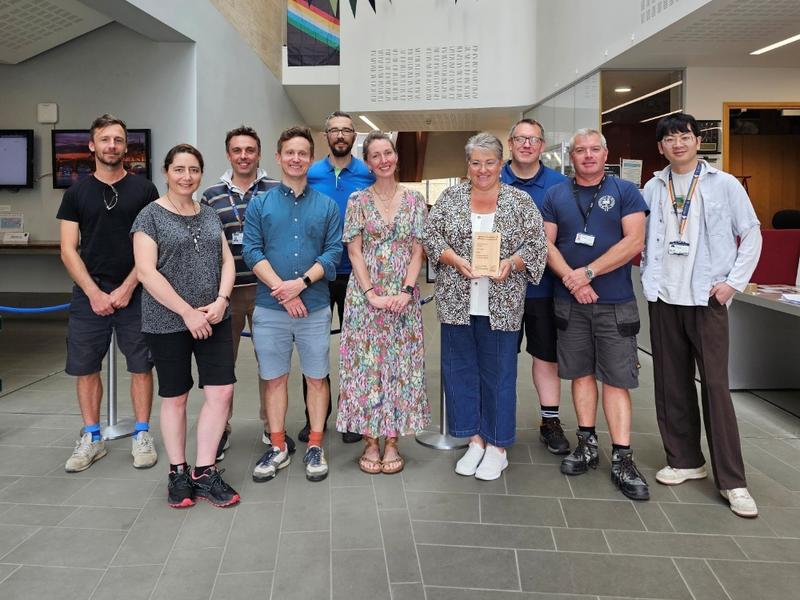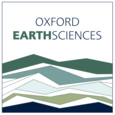Oxford Earth Sciences recognised in Green Impact and LEAF Sustainability Awards
We are proud to announce that the Department has received a number of Sustainability Awards this year, recognising the commitment of our technical staff to driving improvements across our building. The Department was awarded their fifth Gold Award in the Green Impact Programme, and seven facilities received a LEAF Award for Sustainable Laboratories, of which five were certified as gold standard.
Green Impact is an award-winning programme that breaks down the often-complex world of sustainability into practical steps that University members can take to improve sustainable practice within their building, department or college. Teams can approach Green Impact at a range of levels, and make their way through workbooks designed to suggest positive changes. This year’s Gold Award recognises the dedication of our Buildings and Facilities Team, Ashleigh Hewson, Jeanette Stimpson and Jason Dowsing, to improving sustainability in the Department.
“I am really pleased that we received a gold award as part of Green Impact this year. We accomplished a lot for a small department, including initiatives such as Fruit Friday, our rooftop vegetable planters, and polystyrene recycling. I’m excited to see what we can achieve next year.”
- Jeanette Stimpson, Receptionist and Green Impact Team Member
In addition, a large number of our facilities received a LEAF Award for Sustainable Laboratories. The LEAF (Laboratory Efficiency Assessment Framework) awards are an innovative scheme created to drive improvements in laboratory efficiency. Labs across the University undergo self-assessment and peer review. Participants complete a set of criteria to reach Bronze, Silver or Gold standard, and can estimate the carbon and financial savings their actions have achieved. This work is incredibly important, as laboratory buildings are responsible for over 60% of total energy consumption and carbon emissions across the University.
“It’s very encouraging to see the continuing commitment of the Department to sustainability initiatives. I’m very proud of what our technical staff have accomplished this year”
- Ashleigh Hewson, Building and Facilities Manager

Workshop – GOLD AWARD
The Earth Sciences Workshop helps internal and external research groups perform groundbreaking research by designing and producing lab and field equipment. They manufacture specialist equipment for lab groups within the Department and University, as well as across the world.
“We were pleased to have achieved a gold LEAF award this year. We have found a recycling company that take on plastic waste that is contaminated with coolant meaning we can recycle far more plastic. We have also been using filtered acetone which would have been wasted the year before as it was not pure enough for lab use.”
- James King, Workshop Manager
Wet Chemistry – GOLD AWARD
The Wet Chemistry Lab supports research in geochemistry, environmental science, palaeontology, and sample preparation. Researchers use a range of chemical techniques to digest, purify, and analyse rock, soil, water, and fossil samples, helping to advance our understanding of Earth systems and past environmental processes.
“We're proud to have achieved LEAF Gold again this year for the Wet Chemistry Lab. This reflects our continued commitment to sustainable lab practices and a strong safety culture. Over the past year, I focused on improving chemical sharing across research groups, optimizing energy use, and embedded sustainability into everyday lab operations and inductions across the department. We also changed our recycling provider, enabling us to recycle up to five types of lab plastics — a significant step forward in reducing our environmental impact.”
- Jerry Tian, Lab Manager
Stable Isotopes Lab – BRONZE AWARD
The Oxford Earth Sciences Stable Isotope laboratory measures H, N, C and O isotopes in solids, solutions and gases for a wide range of applications (geology, archaeology, carbon sequestration, chemistry, medicine). Measurements are conducted on a gas source mass spectrometer, facilitated by peripherals that transform varied sample types into pure gases for isotopic measurements.
“Over the past 10 years the laboratory has been reducing its ecological footprint: reducing power consumption (e.g. with fewer vacuum pumps, timers applied to oven use), re-using sample containers, and recycling waste. The LEAF process, with helpful online energy use calculators and advice for improving processes, were highly beneficial for further improving the laboratory's efficiency.”
- Chris Day, Lab Manager
Geofacilities – GOLD AWARD
Geofacilities is a multi-lab small research facility with a heavy user-facing focus, supporting the preparation of samples for petrography/mineralogy, crushed samples for geochemistry, XRD etc. as well as the provision of microscopes for research use and the curation of long-term departmental collections.
“We are thrilled that our sustainability audit has confirmed Gold level status. We focused heavily on the reducing and recycling of single use lab consumables, and made a big push on the sustainable use of equipment, encouraging to switch off where possible, and to think ‘green’ when using ultrasonic cleaners and ovens by running batches over single sample runs. We will continue to make sustainability an induction item to build the green culture into everyone entering the facility. We will also be mindful to buy sustainably manufactured chemicals and consumables, push for suppliers to use less single use packaging, and be conscious of our consumption of lab supplies using as little as necessary to produce high quality samples.”
- Emily Donald, Geofacilities Manager, and Virginia Ettwein, Geofacilities Technician
Hilton WaterLab & Trace SRF Collective – GOLD AWARD
The Hilton WaterLab & Trace SRF Collective under Prof Bob Hilton and lab managers Hilde Cronwright and Phil Holdship analyse samples for ion chromatography and ICP-MS analysis to detect elemental compositions of water and other samples.
“Our labs have been awarded Gold Leaf certification for a second year in a row. We find the LEAF process results in cost and waste reduction by using less plasticware and increased awareness of how to responsibly dispose of waste. This is easy as the Department facilitates waste disposal and recycling for all facilities. In our lab we have achieved a 50% reduction in plastic vials used for IC analysis as the same sample vial is re-used for anion and cation analysis of the same sample. When doing ICP-MS analysis we employ Prep FAST auto-diluting which significantly reduce plastic tube and pipette tip use, especially for preparing calibration standards.”
- Hilde Cronwright and Phil Holdship, Lab Managers
The Rickaby and Cosmidis Labs – GOLD AWARD
The Rickaby (Oceanbug) labs are used for the culturing and analysing of assorted (often biomineralizing) algae as well as preparing and inspection of the sediment records of the biomineralized portion. The Cosmidis labs are used to culture bacteria and investigate the interaction interactions between minerals, microbes, and organics.
“To achieve a Gold Level LEAF Award in the Rickaby and Cosmidis labs, we upheld standardised procedures to reduce waste, we implemented inventory monitoring and tracking to reduce the number of orders and unnecessary stock, and used a lab webpage for equipment booking, sharing of procedures, submission of orders, and meeting arrangements. We also covered sustainability during lab inductions with new members, including topics like waste streams and proper sample management.”
- Luke Williams, Lab Manager
Clean Labs and Multi Collector Instrument Labs – BRONZE AWARD
The Department’s Clean Labs are metal free (MF) ISO-certified facilities which contain several fume hoods, used for trace element and isotope analysis preparation chemistry. The multi-collector ICP-MS labs have advanced plasma instruments used for precise measurement of isotope systems in sample solutions, following column separation chemistry typically completed in the cleanrooms. The cleanroom's dust and dirt-free environment and ultrapure water and acids prevent the contamination of precious samples which contain trace levels of the element or isotope of interest.
“The cleanroom and instrument lab users encourage sustainable practices wherever possible, so we were excited to receive a LEAF Bronze Award this year. The labs go to great efforts to wash, dry, and recycle (via RecycleLab) any single-use lab plastics, such as pipette tips and autosampler vials. Most of the other plastic items used in the cleanrooms are acid-leached and reused indefinitely, which is more sustainable than single-use recyclable plastics. We also make sure that the laminar flow hood sashes are closed when the cabinet is not in use and raised to the appropriate level when in use.”
- Stacey Carolin, Laboratory Manager in Isotope Geochemistry
Many congratulations to the technical staff whose work in driving forward our sustainability initiatives was recognised by these awards!




